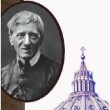Newsletter 2008 – Newman and Rome
 Dr. Brigitte Maria Hoegemann FSO Long before the Anglo-Catholic Oxford don actually saw the city, its name must have resonated with John Henry Newman, evoking not just images of the ancient city, kingdom, republic and empire, its history of three thousand years, its rise and the fall, but also its huge claim to power and its unique culture of antiquity both pagan and Christian. …
Dr. Brigitte Maria Hoegemann FSO Long before the Anglo-Catholic Oxford don actually saw the city, its name must have resonated with John Henry Newman, evoking not just images of the ancient city, kingdom, republic and empire, its history of three thousand years, its rise and the fall, but also its huge claim to power and its unique culture of antiquity both pagan and Christian. …






